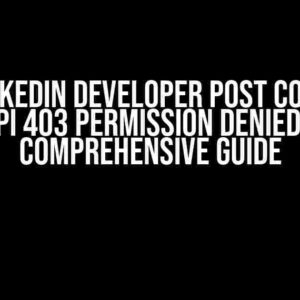Are you tired of VS Code driving you crazy by quitting automatically every time you try to open it? You’re not alone! Many developers have reported this frustrating issue, but don’t worry, we’ve got you covered. In this article, we’ll dive into the possible causes and provide step-by-step solutions to get your VS Code up and running smoothly.
- Possible Causes of VS Code Quitting Automatically
- Solution 1: Check for Corrupted Settings or Configuration Files
- Solution 2: Disable Extensions and Check for Conflicts
- Solution 3: Update or Reinstall VS Code
- Solution 4: Check System Resource Issues
- Solution 5: Run VS Code in Safe Mode
- Solution 6: Check for Malware or Virus Infections
- Conclusion
- Additional Tips and Tricks
Possible Causes of VS Code Quitting Automatically
Before we dive into the solutions, let’s explore some possible reasons why VS Code might be quitting on you:
- Corrupted Settings or Configuration Files: Sometimes, a misconfigured setting or a corrupted file can cause VS Code to malfunction.
- Extension Issues: A problematic extension can cause VS Code to crash or quit unexpectedly.
- Outdated or Incompatible Extensions: Using outdated or incompatible extensions can lead to conflicts and cause VS Code to quit.
- System Resource Issues: Low system resources, such as RAM or disk space, can cause VS Code to quit automatically.
- Malware or Virus Infections: In rare cases, malware or virus infections can cause VS Code to malfunction.
Solution 1: Check for Corrupted Settings or Configuration Files
Let’s start by checking for corrupted settings or configuration files:
- Close VS Code (if it’s open).
- Open the Command Palette in VS Code by pressing
Ctrl + Shift + P(Windows/Linux) orCmd + Shift + P(Mac). - Type “Reset Settings” in the Command Palette and select “Reset Settings (without extensions)” from the dropdown list.
- VS Code will prompt you to confirm. Click “Reset” to proceed.
- Wait for VS Code to reset its settings. This might take a few seconds.
- Restart VS Code and see if the issue is resolved.
Solution 2: Disable Extensions and Check for Conflicts
If the issue persists, let’s disable extensions and check for conflicts:
- Close VS Code (if it’s open).
- Open the Extensions view in VS Code by clicking the Extensions icon in the left sidebar or pressing
Ctrl + Shift + X(Windows/Linux) orCmd + Shift + X(Mac). -
Disable all extensions by clicking the “Disable All” button at the top-right corner of the Extensions view.
- Restart VS Code and see if the issue is resolved.
- If the issue is resolved, re-enable extensions one by one to identify the problematic extension.
- If you find a problematic extension, try updating or uninstalling it.
Solution 3: Update or Reinstall VS Code
If the issue persists, let’s try updating or reinstalling VS Code:
- Check for updates by clicking the “Check for Updates” button in the bottom-left corner of the VS Code window.
- If an update is available, click the “Update” button to download and install the latest version.
- If updating doesn’t work, try reinstalling VS Code:
- Windows: Go to the
%USERPROFILE%\.vscodedirectory and delete the entire folder. Then, download and install the latest version of VS Code. - Mac: Go to the
~/Library/Application Support/Codedirectory and delete the entire folder. Then, download and install the latest version of VS Code. - Linux: Delete the
~/.vscodedirectory and then reinstall VS Code using your package manager. - After reinstalling, try opening VS Code again and see if the issue is resolved.
Solution 4: Check System Resource Issues
If the issue persists, let’s check for system resource issues:
- Check your system’s disk space by opening the File Explorer (Windows) or Finder (Mac). Make sure you have at least 1 GB of free disk space.
- Close other resource-intensive applications to free up system resources.
- Check your system’s RAM usage by opening the Task Manager (Windows) or Activity Monitor (Mac). Make sure VS Code is not consuming too much RAM.
- If you’re running low on system resources, consider upgrading your hardware or optimizing your system for better performance.
Solution 5: Run VS Code in Safe Mode
If the issue persists, let’s try running VS Code in Safe Mode:
- Open the Command Palette in VS Code by pressing
Ctrl + Shift + P(Windows/Linux) orCmd + Shift + P(Mac). - Type “Open in Safe Mode” in the Command Palette and select “Open in Safe Mode” from the dropdown list.
- VS Code will restart in Safe Mode, which disables all extensions and loads the default settings.
- If VS Code runs smoothly in Safe Mode, it might indicate an issue with one of your extensions or settings.
Solution 6: Check for Malware or Virus Infections
If all else fails, let’s check for malware or virus infections:
- Run a full system scan using an anti-virus software to detect and remove any malware or viruses.
- Use a malware removal tool to scan and remove any malicious software.
- Check your system’s event logs for any suspicious activity.
- If you find any malware or viruses, remove them and restart your system.
Conclusion
That’s it! By following these solutions, you should be able to fix the issue of VS Code quitting automatically. Remember to always keep your system and VS Code up to date, and be cautious when installing extensions to avoid conflicts.
| Solution | Description |
|---|---|
| 1. Check for Corrupted Settings or Configuration Files | Reset VS Code settings to their default values. |
| 2. Disable Extensions and Check for Conflicts | Disable all extensions and re-enable them one by one to identify the problematic extension. |
| 3. Update or Reinstall VS Code | Update VS Code to the latest version or reinstall it to start from scratch. |
| 4. Check System Resource Issues | Check for low system resources, such as disk space or RAM, and optimize your system for better performance. |
| 5. Run VS Code in Safe Mode | Run VS Code in Safe Mode to disable extensions and load default settings. |
| 6. Check for Malware or Virus Infections | Check for malware or virus infections and remove them to ensure system security. |
Additional Tips and Tricks
Here are some additional tips and tricks to help you troubleshoot VS Code issues:
- Check the VS Code logs: Open the Command Palette and type “Open Log Folder” to access the VS Code logs.
- Disable Hardware Acceleration: If you’re experiencing performance issues, try disabling hardware acceleration in the VS Code settings.
- Clear the Cache: Clear the VS Code cache by deleting the
%USERPROFILE%\.vscode\cachefolder (Windows/Linux) or the~/Library/Application Support/Code/cachefolder (Mac). - Check for Extension Conflicts: Use the “Extension Bisect” feature in VS Code to identify conflicting extensions.
By following these solutions and tips, you should be able to resolve the issue of VS Code quitting automatically and get back to coding in no time!
Happy coding!
Frequently Asked Question
Don’t let VS Code drive you crazy! If it keeps quitting on you, we’ve got the answers to get you back to coding in no time.
Why does VS Code keep quitting on me?
This could be due to a variety of reasons, including corrupted files, incompatible extensions, or even a bug in the VS Code itself. Don’t worry, we’ll help you troubleshoot the issue and get back to coding in no time!
Is it because of a specific extension?
Possibly! A faulty or incompatible extension could be causing VS Code to quit unexpectedly. Try disabling all extensions and then re-enabling them one by one to identify the culprit. You can also check the VS Code Extensions Marketplace for updated versions or reported issues with the extension.
Could it be a problem with my project files?
Yes, it’s possible! Corrupted project files or a mismatched file format could be causing VS Code to crash. Try reinstating the project files from a backup or re-creating the project from scratch. You can also try opening a new instance of VS Code with a new project to isolate the issue.
Is it a problem with my VS Code installation?
Maybe! A corrupted VS Code installation or a bug in the version you’re using could be the culprit. Try reinstalling VS Code or updating to the latest version. You can also try resetting VS Code to its default settings or deleting the VS Code configuration files to start from scratch.
What if none of these solutions work?
Don’t give up hope! If none of these solutions work, you can try seeking help from the VS Code community or filing a bug report on the VS Code GitHub page. You can also try resetting your system or reinstalling your operating system as a last resort.





